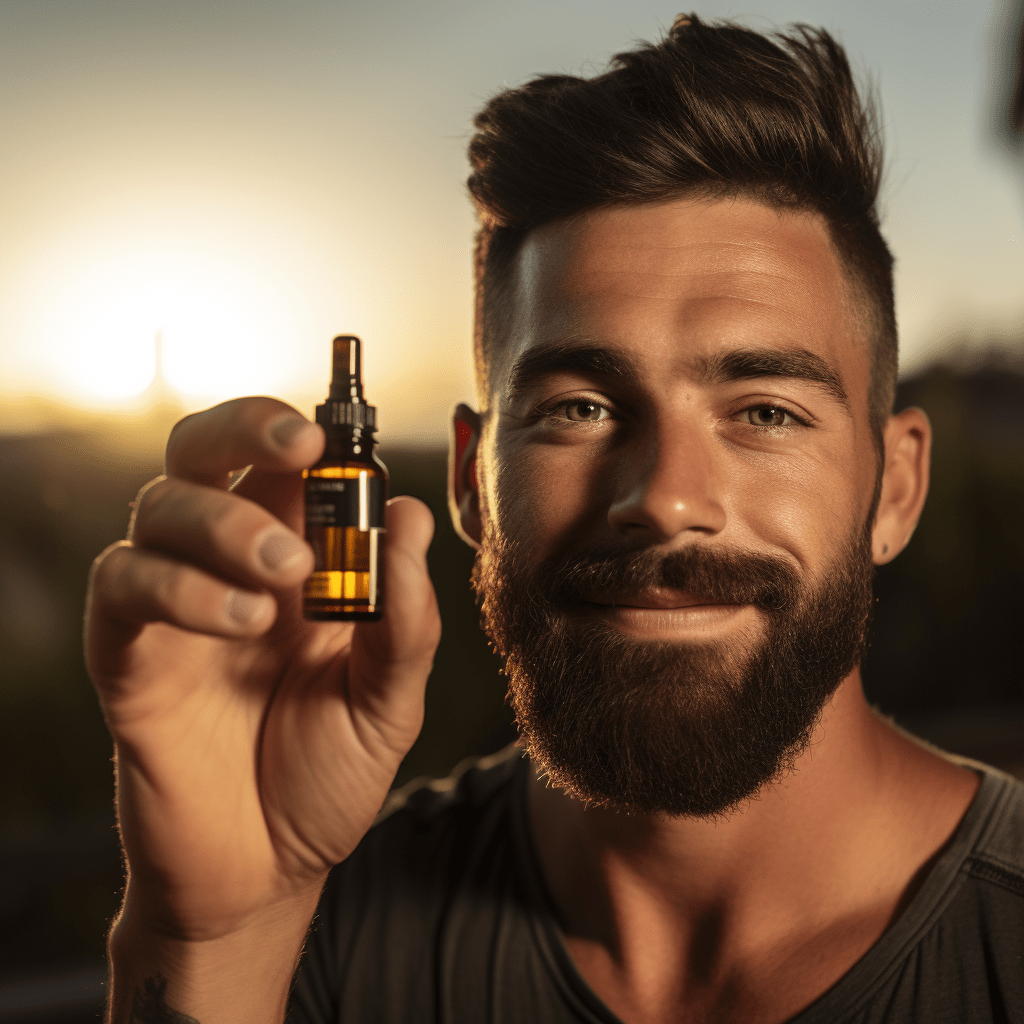The powerful benefits of CBD oil for athletes have driven its increasing use for sports recovery and performance optimisation.
More sportspeople and coaches than ever are swearing by it.
Among athletes, CBD oil is particularly valued for its ability to help with everything from achy muscles to anxiousness before competitions or even getting better sleep.
It’s the ideal natural performance aid every athlete needs in their toolkit, from amateurs to professionals.
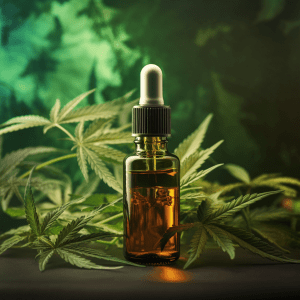
CBD oil enhances overall athletic output by supporting exercise recovery holistically.
But it’s also excellent to help manage the mental and physical challenges that accompany sport.
Some sportspeople use it to mitigate pain from sports injuries. It can alleviate irritation from scrapes, pulled muscles or strains. When used topically as CBD cream, it helps to soothe and reverse the damage that sports can cause.
Many take CBD oil to deal with sports anxiety. That’s because it has relaxing mental effects, which ease the nerves. This helps with performing under pressure.
Let’s examine the top benefits of CBD oil for athletes. We’ll run through why it’s so helpful for sports recovery, plus how to use it to enhance your game.
Contents
Benefits of CBD Oil for Athletes
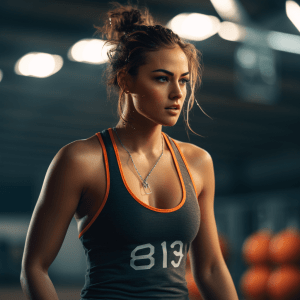
It’s no secret that CBD oil has immense benefits for athletes.
Especially when combined with a high-quality training program, dietary plan and recovery regime.
However, not everyone is well-versed in this natural product’s anti-inflammatory advantages for sportspeople.
CBD has a range of recovery-promoting powers because it activates the endocannabinoid system in the body.
Some of these include:
- Reduced aches or strains from sore muscles
- Better recovery from sports injuries
- Mitigated anxiety from sports or competing
- Improved gut health and bodily inflammation levels
- Better sleep and faster exercise recovery
- Less reliance on NSAIDs
It’s highly effective as a multi-target, ‘full-spectrum’ support for wellbeing.
Let’s explore these effects in more depth.
Reducing Strains and Soreness
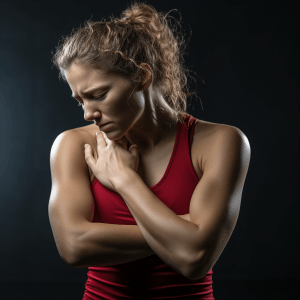
The most well-known advantage of using CBD oil for athletes is reducing aches and soreness in the muscles or joints after exercise.
Intense or prolonged exercise can lead to inflammation in these tissues, particularly for athletes who engage in high-impact or repetitive sports. For example, track and field runners often get sore or inflamed knees.
Inflammation leads to the familiar achy pains you get as the body repairs itself in response to being damaged at a micro level. Delayed onset muscle soreness is very commonplace in athletes and everyday sportspeople alike. You can probably remember a time when you had deep muscle tension in the days following a challenging day of running or weightlifting.
While the soreness is natural, you don’t need to endure the discomfort it causes.
CBD oil can aid the inflammatory process, helping tissues regulate excessive inflammation while offering analgesic properties to minimise pain. It provides metabolic and repair benefits for cells, helping your muscles recover more efficiently and reduce downtime.
How CBD Soothes Muscle Aches
How does CBD soothe muscle aches in athletes? It does so by altering the inflammatory response in the body.
The cannabinoid activates endocannabinoid pathways in the immune system. In turn, it can change the signalling of immune proteins like cytokines. Some of these, such as TNF-alpha, are primarily responsible for our inflammation activating, which causes aches after training.
Lowering TNF-alpha levels by using CBD oil helps to reduce the swelling and soreness that inflamed muscles experience.
CBD works on TNF-alpha via CB2 receptors in peripheral tissues like muscles, nerves and tendons. Interacting with them promotes endocannabinoid release and soothes inflammatory immune activity in the affected region.
These pathways function similarly to anti-inflammatory compounds like NSAIDs and corticosteroids, but without the nasty side effects these chemicals can cause.
Many athletes prefer CBD gummies or oils as a natural muscle ache relief. These are safe to use consistently long-term, which isn’t the case with NSAIDs. NSAIDs can cause organ damage if taken too much.
CBD cream is another way to calm achy, sore muscles. It can be applied topically directly to inflamed muscle sites. It gets quickly absorbed into muscle cells, fascia and surrounding nerve regions to relieve the area. Muscle tissue gets deeply rejuvenated. But advantageously, CBD creams and topicals won’t cause any irritation or long-term risks. They’re great for athletes to be available for post-training soreness alleviation.
Sports Injury Recovery Support
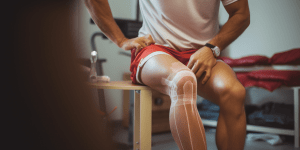
It’s common for athletes to use CBD oil as part of their sports injury recovery protocol. That’s because it has analgesic or pain-relieving properties which assist with injury management.
Using it as you recover can significantly assist with sports injury pain, aches and discomfort.
Strains and injuries are inevitable in sports pursuits. They might be caused accidentally by pushing too hard. It’s equally common to experience them from mishaps or slips during sports games.
Athletes are no strangers to pulled muscles, twisted ankles and tendon strains.
If left unchecked, however, minor injuries can worsen or develop into chronic pain. This type of nagging injury pain can cause long-term discomfort and impact athletic performance. For example, an athlete might feel ankle pain whenever they run from an ankle tear from years earlier.
CBD oil can be used by recovering athletes orally or topically to help ease these nagging injury aches.
It mitigates pain sensations for certain pain types. Specifically, it works for nerve pain by lowering pain perception or nociception. By interacting with CB2 cannabinoid receptors in the nociceptors (nerve cells for pain), CBD blocks some of the pain signals from the nervous system to the brain. This reduces discomfort from sports injuries, helping to improve life quality.
Additionally, the cannabinoid provides similar analgesic effects by altering an athlete’s perception of it. In binding to CB1 cannabinoid receptor sites in the brain and CNS, CBD reduces pain perceptibility. This substantially reduces the distressing, disruptive mental effects that pain results in.
Many athletes report reduced pain sensations from nagging injuries in the days or weeks after starting with CBD oil. Some use it topically on ongoing sources of chronic pain like damaged tendons.
Sports injuries can be frustrating because of the ongoing irritation and pain they can cause. By using CBD oil for sports injuries, athletes can better manage these symptoms.
This lets them return to their feet more quickly and rebuild to peak athletic performance.
Reducing Sports Anxiety
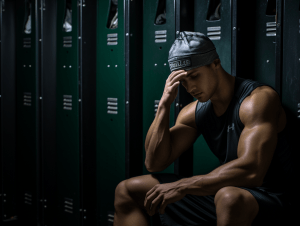
CBD oil’s anxiety-reducing effects make it very useful for athletes dealing with sports anxiety from the intense pressures of competing.
Sports games and athletic competitions can be very demanding and stressful. Even amateur sportspeople can experience intense anxiousness or shaken nerves.
At the highest professional levels, anxiety can become impairing to performance.
Racing thoughts, excessive worry and problems sleeping from anxiety often are more significant challenges than injuries or illness.
Sports anxiety can bleed into physical symptoms, too. Cortisol (the stress hormone) from anxiousness has real detriments to athletic output.
It has a range of detrimental health impacts, such as:
- Reducing sleep quality or causing insomnia
- Causing weight gain and muscle loss
- Reducing the ability to focus and concentrate
- Impacting mental energy levels
- Dampening nervous system function, causing fatigue
Stress and anxiety are invariably damaging to the success of athletes. They must be avoided to stay composed under pressure and achieve results.
This is where CBD oil can assist because of its ability to suppress sports-related anxiety.
It relaxes the mind and works to prevent nervousness that can arise from competing. CBD downregulates the stress response and helps with controlling stress. The downregulation of this response enables athletes to build resilience to sources of anxiety, like high-stakes sports games.
Enhanced Focus for Games
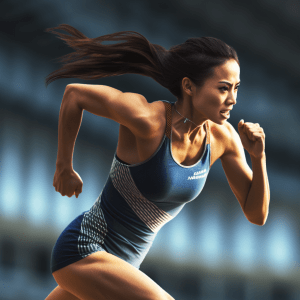
The mental benefits of CBD oil for athletes don’t just apply to mitigating anxiety from competing.
Many athletes favour it to help them stay in the zone when they need maximum concentration.
Getting in the right mental state is essential for competing optimally.
Pre-game rituals like a favourite meal are common ways that sportspeople prepare to perform.
More commonly now, athletes take CBD gummies or oil to help them mentally re-centre before games.
These products help prime the mind for competition, calm performance nerves, and help athletes stay composed.
Most of these properties are due to stress-relieving endocannabinoids such as anandamide. CBD triggers the release of these compounds when it binds with cannabinoid receptors in the hypothalamus.
They alleviate anxious feelings, enabling a relaxed emotional condition.
CBD’s interaction with gamma-aminobutyric acid (GABA) receptors may also contribute to its calming effects. GABA is an inhibitory neurotransmitter that helps regulate excitability in the brain. Some studies suggest that cannabinoids (like CBD) positively affect GABA regulation, which helps with calmness.
Stimulating GABA is beneficial for athletes as it blocks sports anxiety.
Incorporating CBD oil into pre-training or game routines can be valuable. It will ease the nerves, keeping you grounded and focused for your match.
Inflammation and Gut Health Promotion
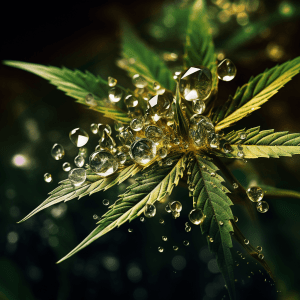
Athletes train very frequently.
Over time, frequent exercise can strain the body and cause inflammation. Recovery has to be prioritised, and short-term treatment options to lower inflammation in some cases.
CBD oil can help athletes combat inflammatory symptoms due to its anti-inflammatory effects.
Research has demonstrated these capacities in cannabinoids, which can help prevent chronic inflammation. The compound alters the production of immune signalling chemicals such as prostaglandins and cytokines.
Chronic inflammation typically results from excessive amounts of these signalling chemicals the immune system produces. If this occurs, it can contribute to many adverse health consequences and conditions like rheumatoid arthritis.
Anti-Inflammatory Effects
Better regulating the immune response and normalising their levels means athletes can lower inflammatory markers throughout their body and prevent swelling, soreness or irritation in their tissues.
Doing this has several key benefits for athletes:
- Joint inflammation: in the joints, CBD activates CB2 cannabinoid receptors to stimulate calming, anti-inflammatory effects. It acts restoratively and preventatively, helping shield the joint sheath from damage while counteracting irritation. This is exceptionally valuable for athletes to help with inflamed joint tendons or cartilage after training. But it can also assist in reducing the risk of joint damage and degradation from inflammatory joint issues like rheumatoid arthritis.
- Gut health: CBD oil prevents inflammation throughout the digestive system by normalising immune function. Many gut conditions, such as irritability (IBS) and colitis, are caused by chronic inflammation in the intestinal lining from immune dysregulation. CBD can counteract these problems, which improves gut health. Preventing the disruptive effects of gut inflammation aids with digestion and intestinal permeability. The cannabinoid provides these effects via CB2 receptor activity within the gut and its lining. This produces endocannabinoids in the region, which work to normalise gut immune markers and inflammatory activity. Athletes can resultantly absorb nutrients better and make the most of their nutrition.
- Neuroinflammation: the clinical evidence shows that CBD oil can also help reduce neuroinflammation, which helps prevent neurons from misfunctioning. The cannabinoid is both neuroprotective and anti-inflammatory within the brain. When it binds to cannabinoid receptors in different brain regions, it stimulates regulatory pathways that help to protect neurons from inflammatory damage and excitatory activity. CBD is so effective for protecting neurons that it’s even used in medications for Epilepsy to prevent seizures. But using it daily to help with general cognitive well-being is equally valuable. For athletes, it could promote focus and mental acuity during training or games via similar mechanisms.
Because inflammation can affect many body areas, reducing its impact is vital for athletic performance. Taking advantage of the anti-inflammatory effects of CBD oil is a way more athletes are now taking their game to the next level.
NSAID Alternative
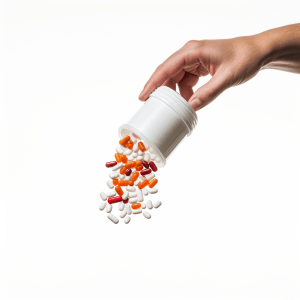
Athletes suffering from sore muscles, knees or tendons often reach for NSAIDs (non-steroidal anti-inflammatory drugs) like ibuprofen to help with the inflammation they experience.
NSAIDs are effective, but they aren’t without risk.
Their side effects can be severe if misused. Examples include stomach ulcers, cardiac risks, kidney damage and renal failure.
What’s worse is that these risks become substantially increased if NSAID medications are used for long periods. They are only really suited for very short-term relief.
This makes them a poor solution for athletes seeking to mitigate chronic, long-term inflammation or pain symptoms.
For many athletes, CBD oil will be a superior, natural option. It can replace NSAIDs in many cases, providing a natural anti-inflammatory alternative that won’t cause severe health risks when used for long periods.
It operates on similar metabolic pathways as NSAIDs but isn’t quite as strong. In particular, CBD helps reduce prostaglandin production like NSAIDs by blocking COX enzyme channels. Prostaglandins are inflammatory. Lowering their impact on the immune system and body is vital in counteracting inflammation and the pain it can cause.
While milder, CBD oil has more complementary benefits versus NSAIDs that help athletes across many axes of health. It has advantages that make it suited as a general well-being aid beyond just reducing inflammation.
However, its most considerable advantage over NSAIDs is the low side effect risk it has. Even when consumed in very high amounts, CBD oil is unlikely to cause any irritation or side effects. It can be taken for long periods daily to help calm inflammatory markers with little drawback.
Sleep Quality

Sleep is critical to both physical and mental recovery.
The sleep benefits of CBD oil for athletes can be profound in its ability to enhance this recovery.
During sleep, the body undergoes repair at the cellular level. Tissue, tendons, joints, and muscles get healed. They’re built back stronger, becoming adapted to higher training loads.
Hormones are also produced and regulated during sleep. It’s essential for good metabolic function, immunity and energy balance.
However, it’s common for athletes not to get the sleep they need. This could be due to symptoms of insomnia, sports anxiety, poor habits or even genetics.
Poor sleep can result in reduced recovery, weaker training performance and higher fatigue. Its detrimental effects can also accumulate over time and exacerbate these issues.
This is where CBD oil can help. It works in the brain to help regulate circadian rhythm, build sleep consistency and prevent insomnia.
It aids the mind in calming into a relaxed state, making it easier to get into a deep slumber. Commonly, it’s taken an hour or so before bed by athletes to prepare for sleep.
REM Stage Length
Products like CBD gummies have also been shown to improve sleep length and quality or depth. Specifically, they extend the REM stage cycle length, increasing recovery from sleep.
REM periods of sleep are when most of the recovery and benefits from sleep are stimulated. This makes maximising REM sleep in athletes of paramount importance.
CBD’s interactions with CB1 receptors in the brain are responsible for these effects.
Endocannabinoid system pathways in the hypothalamus guide circadian rhythm balance and improve sleep cycle regularity. Activating these pathways using CBD oil helps to prevent insomnia symptoms like sleep onset delays.
Studies have shown it can stimulate serotonin production, which has sleep benefits for athletes. Serotonin plays a crucial role in calming down before sleep. It’s a precursor to melatonin, the hormone responsible for sleep regulation.
Boosting melatonin secretion and keeping this hormone well-regulated using CBD oil is similarly associated with excellent sleep health.
To recap, the ability of CBD oil to promote better, longer sleep is a core way it supports athletic recovery. As such, it’s seeing greater use than ever before bed among athletes.
Does CBD Oil Improve Athletic Performance?
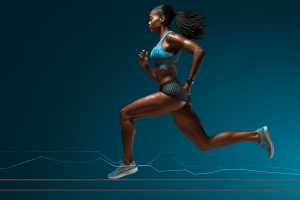
CBD oil has become a hot topic in the sports community for its potential to improve athletic performance.
But it doesn’t provide these performance-enhancing effects directly.
Instead, CBD oil is a way for athletes to recover better and faster.
It’s valued for boosting muscle, tissue and tendon recovery due to its antioxidative and anti-inflammatory powers. These properties help naturally rejuvenate the body’s cells and increase recovery speed.
Simultaneously, it offers analgesic or pain-mitigating benefits that mean athletes can minimise soreness and return to exercising faster. Lowering downtime between training or games is a significant way CBD oil improves athletic performance. The more athletes can recover between sessions, the greater their possible training frequency. A higher training frequency will lead to amplified exercise adaptation and performance over time.
Additionally, by interacting with the endocannabinoid system, CBD modulates the stress response, helping athletes manage pre-competition anxiety and stress. Managing anxiety better can help boost athletic performance by increasing an athlete’s ability to stay in control and attentive during games.
So, does CBD oil improve athletic performance?
It definitely does. However, athletes can best activate these performance improvements by using it to boost their recovery regime. Repairing and replenishing the body better will mean greater output at training and, eventually, competitions.
How to Use CBD Oil for Athletes

There are a few ways that athletes can use CBD oil for sports recovery and athletic performance.
How Much CBD Should an Athlete Take?
The dosages of CBD oil an athlete takes need to be carefully decided by them in discussion with their coach and sports nutritionist.
It’s vital to factor in metabolism, body size, tolerance, sensitivities, and what outcome is desired for sports recovery.
These factors will influence how much CBD oil an athlete needs to achieve their desired results. However, starting with lower dosages to test for any potential intolerances or sensitivities is a good idea.
Some people (even athletes) can be allergic to cannabinoids like CBD.
Dosage Recommendations
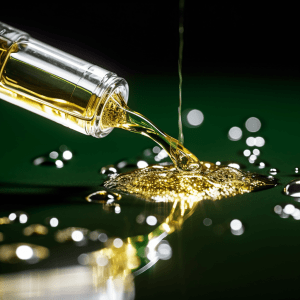
Finding this out early with test doses of small quantities is an intelligent way to begin. A standard recommendation is 1–6 mg of CBD per 4.5kg body weight. Athletes with higher body weights may require a higher dosage, while those with lower weights won’t need as much.
After this, you can ramp up your CBD oil doses and experiment to find the optimal quantity for your athletic endeavours. Most athletes find daily dosages of 300-600mg to be the most effective range for helping to optimise performance. But it entirely depends on how an individual responds to the cannabinoid and what they’re taking it for. Ultramarathon Runners with severe knee pain, for instance, might need far more CBD oil to be helpful than an amateur running a few times a week.
Try out differing dosage levels and product strengths to find an approach that suits your needs.
Consultation with a doctor and sports medicine experts is recommended before taking any new health product, especially for athletes with pre-existing health conditions or taking any medications.
Ultimately, athletes should approach CBD oil use with a cautious mindset, aiming to strike a balance between achieving therapeutic effects and avoiding unnecessary or excessive consumption.
Monitoring responses when dosing is vital to ensure a product is delivered for athletic performance and recovery.
What’s the Best Time to Take CBD Oil for Recovery?
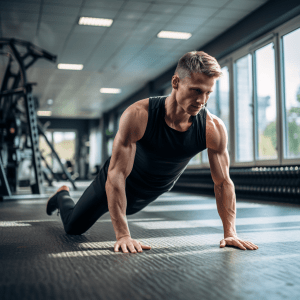
There is ongoing debate around the best time of day to take CBD oil for recovery among sportspeople and athletes. Some people prefer it in the morning or before workouts. For others, better results are seen from the nighttime use of CBD gummies or oils as a sleep aid.
There isn’t a consensus on this question.
Every athlete responds differently and has personal preferences regarding using products like CBD gummies.
Here are some of the typical times to take it for performance purposes:
- Morning Routine: Some athletes incorporate CBD oil into their morning routine, for example, putting a few drops in their morning coffee. It’s a great way to mitigate performance stress, lower anxiety, and decrease stress levels during the day. This can help to counteract fatigue and boost mental energy, keeping athletes fresh for their sport. Furthermore, morning CBD oil use can reduce joint stiffness, inflammation, or aches that can crop up throughout the day, primarily if you worked out the night before or are sore.
- Pre-Workout: Timing your dosages of CBD before your training or games can help with performance anxiety and boost focus. Its stress-reducing effects help athletes stay in the zone, stay composed and perform at their best. CBD has calming and anxiety-alleviating properties, enabling it to reduce mental stress before high-pressure competitions. Plus, its anti-inflammatory effects help with optimal joint and tendon flex during intense exercise. You can even use it to promote hydration during a workout and aid with energy during long training sessions.
- Post-Workout: Using CBD gummies after your workout helps to promote more rapid recovery, ease inflammation in the muscles, plus help lower stress to improve rest. Exercise can cause muscle micro-tears, damage the joints and stimulate the stress response. These can lead to fatigue if not addressed. Boosting healing factors with a tasty CBD dose after training can help prevent reduced physical performance in future workouts. Taking it with nourishing protein and some carbs is a fantastic way to support this healing with the nutrients your body needs for repair.
- Pre-Bedtime: many athletes target their CBD oil doses before bed to maximise the sleep-promoting benefits that the cannabinoid can provide. Taking it an hour or two before you intend to sleep stimulates extended sleep stages, more REM sleep, enhanced sleep depth and improved sleep recovery benefits. You’ll feel fresher and more well-rested. Over time, you should see this reflected in your athletic results.
Importance of Consistency
While there isn’t a best ‘time of day’ to take CBD oil for athletes (this will depend on your preferences), it is usually best to take it every day to maximise its effects. You can even take it throughout the day and split your doses instead of timing it in one go.
Consistency of daily dosages maximises endocannabinoid system activation, enabling your body to get used to the cannabinoid and metabolise it better. This nets more excellent effects on athletic performance.
Side Effect Risks

CBD is a compound with considerable potency and is not immune from side effects.
Although side effects occur, they are rare and only found in a small percentage of athletes.
Overall, the cannabinoid is well tolerated. Some rare side effects of CBD oil in athletes include dry mouth, lethargy, drowsiness, diarrhoea, lower blood pressure, and upset stomach. If you notice any of these, they should be passing. But if not, try lowering your doses or trying a different product. It’s more common for side effects to be the result of subpar CBD products, which can contain irritating contaminants. These are generally the source of these problems.
Types of CBD Products for Athletes
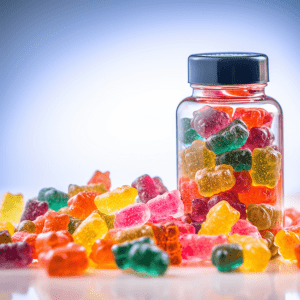
Today, there is an immense selection of CBD products available for athletes.
This wide selection is because CBD can quickly be diffused into many edible, liquid or inhaled forms. As such, more providers are crafting new and exciting ways to deliver it to athletes in ways they prefer.
A few methods include CBD gummies, tinctures, capsules, balms and vapes. Each has pros and cons, but will still be able to improve sports recovery substantially. Let’s take a look at each.
Tinctures
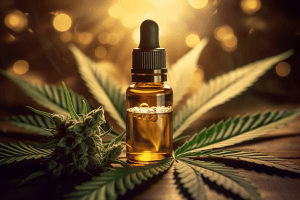
Because of its simplicity and portability, CBD tinctures (or oils) are likely the most common way athletes dose the cannabinoid. It offers a straightforward method of taking CBD at any time of the day. Doses can be carefully measured by the drop, making the dosing accuracy easy. Some athletes use CBD tinctures sublingually by putting drops under the tongue and holding them there for around a minute. This delivers rapid absorption via the gums.
A significant benefit of CBD tinctures is they’re easy to travel with. Athletes can very quickly take them to their training, games or competitions. Taking a quick dose before or after a session becomes a breeze. Some athletes find the palatability of full-spectrum CBD oil to be distasteful. It can contain more plant matter or traces of raw hemp mass, which leaves a more musky flavour. If this is the case, try mixing it into coffees, smoothies or sweeter drinks to mask it.
Edibles
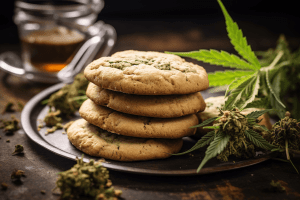
Some athletes prefer using CBD gummies or other edibles like energy bars as a way to get a quick energy hit with their dosage.
These treats are more expensive than CBD tinctures and are slower to absorb because of digestion. But they are much tastier. For athletes, getting more calories and nutrients from CBD edibles will also support recovery. They’re excellent for picky eaters who want a delectable consumption method. Plus, they’re pre-dosed for easy dosage measurement and easy to transport.
Try incorporating CBD gummies, chocolates or other tasty morsels into your recovery protocol. All you need to do is eat them to start benefitting as an athlete.
Topicals
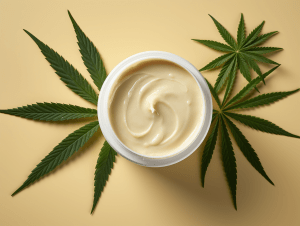
It’s common for athletes to use CBD topicals if they have nagging injuries, sore joints or stiffness. CBD creams, ointments or balms can be applied to a specific area for relief. This is also useful in soothing achy, bruised muscles. Most of these products infuse CBD into moisturisers. They’re smooth and cooling and feel great on the skin’s surface. A big downside of topicals is they have lower bioavailability. The skin doesn’t absorb CBD, as well as other areas. You won’t get as much cannabinoid into your body as some will be lost in the skin’s layers. But it will still be highly effective if you need pain or inflammation relief for a targeted body part.
Capsules
For many athletes, taking CBD oil is not viable because of its ‘plant-like’ taste. To overcome this problem, some use CBD capsules, which have no flavour. These still contain the cannabinoid, but it’s encased in a gelatin casing to shuttle it into the stomach. Each capsule will contain a specific amount of pre-measured CBD. As such, you can accurately know exactly how much you’re taking. For athletes, CBD capsules are a great way to use the product on the go. They can quickly be consumed before bed, after competitions or post-workout.
Beverages
Increasingly, you can find CBD beverages, which are liquids infused with the cannabinoid. Some even include electrolytes and nutrients that help athletes perform, like CBD sports drinks. They’re a fantastic method to hydrate you while enabling you to get your daily dosages. The main downside of these drinks is they can be expensive and less potent than oils. But like edibles or CBD gummies, they’re a more engaging, tasty way to take CBD. They can make it easier to stay consistent by incorporating your dosing into everyday drinks.
Considerations When Buying CBD Oil for Athletes
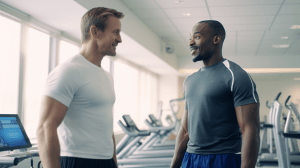
There are some things to consider when buying CBD oil for athletes.
These tips will help you get the most out of your product while minimising any risks associated with low-quality or fake products.
Isolate vs Full-Spectrum
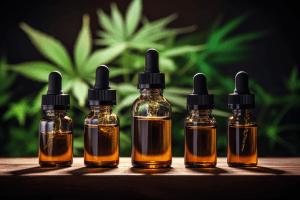
Both isolate and full-spectrum CBD oil can be very beneficial for athletes.
Their primary difference lies in the cannabinoids, terpenes and nutrients they contain.
Full-spectrum CBD oil is less refined and contains minor cannabinoids like CBG, CBN and CBC. It will also have terpenes such as linalool, which help cannabinoids be absorbed, increasing this product’s efficacy. Plus, full-spectrum products contain more plant nutrients, such as antioxidants, vitamins, fibre, minerals, and cannaflavins.
In contrast, CBD isolate oil only contains the cannabinoid in high concentrations, eliminating all other nutrients from the oil. This strengthens it but won’t provide the powerful complementary benefits that minor cannabinoids like CBG can provide. It also doesn’t let you take advantage of terpenes and their anti-inflammatory, pain-alleviating effects that work with cannabinoids.
Choosing between these types as an athlete can be tricky.
We recommend starting with full-spectrum CBD oil, giving you the most bang for your buck. It’s best at fighting inflammation, reducing pain and helping with sports anxiety. That’s because it offers the ‘full spectrum’ of potent phytonutrients and cannabinoids from hemp. It’s also advantageous for athletes because of the vitamins, antioxidants and minerals it’s rich in. These nutrients help further to improve performance, endurance, and recovery alongside CBD.
You can always revisit this at a later stage and try isolated products. However, full-spectrum CBD oil will be best for general-purpose sports performance improvement.
Choosing Reputable Products
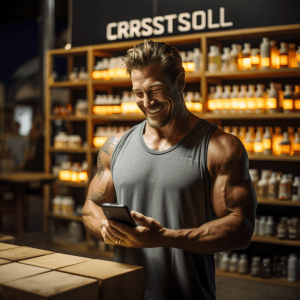
Using a reputable CBD oil product that has undergone third-party lab testing is essential for athletes to avoid consuming low-quality products that can contain contaminants or THC.
These can pose serious risks to an athlete’s health. In addition, if a product is poorly made and contains THC, it could lead to doping bans for failed drug tests.
The last thing you want is to be accidentally banned from your sport. So be cautious when purchasing.
Only select and use pure CBD oil independently verified for quality. Seek reviews, testimonials and online references for the product you’re considering.
Ideally, seek organically sourced products, too. These are less likely to have been treated with pesticides or contain additives. Organically farmed hemp doesn’t get treated with toxic chemicals, making it safer and cleaner when used for producing CBD gummies, oils and other products.
Formulations for Sports
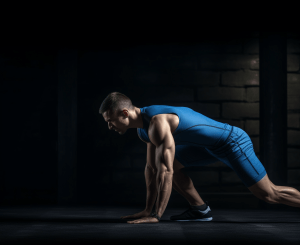
Another tip is to look for CBD products formulated for athletes or sports.
These will be enriched with additional nutrients that benefit athletic performance. For example, they are often fortified with vitamins and minerals. Many function as an electrolyte source in addition to providing you with CBD.
But more importantly, CBD products created for athletes will not have any THC in them. They’re carefully purified to ensure athletes don’t ingest this cannabinoid. This protects athletes from failing athletic drug tests that check for THC. Avoiding it is vital to prevent any issues with your governing sports body.
Athlete Drug Testing Compliance
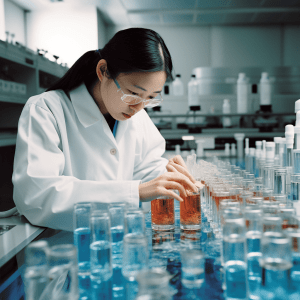
Many professional sports have stringent athletic drug testing regimes.
These are used to identify doping cheats or those using Performance-enhancing Drugs like steroids.
But they also commonly test for THC, which can, unfortunately, contaminate many CBD products. THC is banned due to its side effects, risks, and dangers. It can adversely affect athletes because it’s psychoactive (unlike CBD).
Anti-doping agencies, such as USADA in the US or Sports Integrity Australia, regularly check for THC metabolites in athletes’ bodies.
But the CBD cannabinoid isn’t tested for. It is viewed as a safe and acceptable recovery aid.
This makes it a safe way to support recovery without the risk of sports bans.
It’s a crucial consideration in CBD oil selection. Athletes must only choose products that contain 0% THC and are entirely pure. Even trace levels of THC should be avoided. You may risk failing these tests if your product is low-quality, contaminated, or contains THC.
Conclusion
There’s little doubt about CBD oil’s powerful sports recovery benefits for athletes.
It offers sportspeople a new, natural way to optimise their performance and get an edge over the competition.
More are using it today for better, faster recovery. Many notable athletes like Nate Diaz have already used CBD (in vapes) for their recovery.
Its recovery benefits stem from the cannabinoid’s effects in reducing muscle or joint soreness, aiding with sleep, lowering signs of inflammation, plus calming gut irritation.
These properties make CBD oil an unparalleled sports product that professionals and amateurs should use daily.
Yet its benefits also extend to helping sportspeople focus and stay composed in high-pressure competitive scenarios. CBD oil lowers sports anxiety, enabling a dialled-in mental state to elevate concentration.
It’s a game-changer to have in your toolkit. CBD products are safe, well tolerated, and won’t cause drug testing issues. Many prefer them to NSAIDs for assistance in sports-related inflammation because they can be taken much longer term. Only ever source quality CBD oil from a trusted provider to avoid contaminants. It should also ideally be formulated for athletes.
Before you try CBD oil for your sports, check in with your coach and doctor. You shouldn’t be on any other medications if you are taking them. But also, it’s wise to get expert medical advice before starting with any new natural product.
FAQs
Different athletes have their preferences on the type of CBD oil they use. It’s common to find athletes taking either full-spectrum or isolate CBD oil. Either is perfectly viable. Full-spectrum products contain terpenes, antioxidants and vitamins from hemp that can bolster recovery. Terpenes, in particular, are helpful because they increase the absorption of CBD and other cannabinoids. Isolate products are equally valued because of their high purity and 0% THC. They’re a safer option for athletes who are drug-tested for their sport. THC can cause testing failures, meaning it can’t be consumed. Popular choices often include products with added ingredients like MCT oil for improved absorption. Athletes must choose CBD oils from reputable brands, ensuring they are accurately labelled and free from contaminants.
CBD won’t help you build muscle. But it can help prevent and counteract muscle soreness, pain or aches. It has properties that make it excellent at lowering inflammation. After intense exercise, muscle fibres become damaged and inflamed. As such, reducing inflammation in these fibres helps reduce pain after training. It’s common for athletes to use CBD cream topically on sore muscles to reduce soreness while facilitating repair. Keep in mind only some find it helpful for this purpose. Some athletes opt for NSAIDs or other anti-inflammatory products to soothe muscle aches.
There isn’t a ‘best‘ CBD oil for athletes. The choice depends on the individual and their personal preferences. Isolate, broad-spectrum and full-spectrum products can all be worthwhile. Each will benefit sports recovery and aid with physical performance over time. More important factors to consider are product quality, absence of THC and formulations for athletes. Using a CBD product designed for sports is ideal. These won’t contain any THC and have high purity, making them suited for athletes who must avoid anti-doping bans. THC is drug-tested in many sports, but CBD isn’t. It’s much safer with fewer side effects, too.
Anti-doping agencies like WADA run dope testing for the Olympics. In their dope testing, however, they don’t check for CBD. It isn’t intoxicating or directly performance-enhancing, so it has been excluded from testing regimes. As such, Olympic athletes can use CBD products without the risk of anti-doping violations. It’s always a good idea to check the rules of your sport and the governing body’s doping policies before trying these though.
References
- Atalay, S., Jarocka-Karpowicz, I. and Skrzydlewska, E. (2019). Antioxidative and Anti-Inflammatory Properties of Cannabidiol. Antioxidants, [online] 9(1), p.21. https://www.ncbi.nlm.nih.gov/pmc/articles/PMC7023045/
- Mori, M.A., Meyer, E., Soares, L.M., Milani, H., Guimarães, F.S. and de Oliveira, R.M.W. (2017). Cannabidiol reduces neuroinflammation and promotes neuroplasticity and functional recovery after brain ischemia. Progress in Neuro-Psychopharmacology and Biological Psychiatry, 75, pp.94–105. https://pubmed.ncbi.nlm.nih.gov/27889412/
- Kwan Cheung, K.A., Peiris, H., Wallace, G., Holland, O.J. and Mitchell, M.D. (2019). The Interplay between the Endocannabinoid System, Epilepsy and Cannabinoids. International Journal of Molecular Sciences, 20(23), p.6079. https://www.mdpi.com/1422-0067/20/23/6079
- Shannon, S. (2019). Cannabidiol in Anxiety and Sleep: A Large Case Series. The Permanente Journal, 23(1). https://www.ncbi.nlm.nih.gov/pmc/articles/PMC6326553/
- De Gregorio, D., McLaughlin, R.J., Posa, L., Ochoa-Sanchez, R., Enns, J., Lopez-Canul, M., Aboud, M., Maione, S., Comai, S. and Gobbi, G. (2019). Cannabidiol modulates serotonergic transmission and reverses both allodynia and anxiety-like behavior in a model of neuropathic pain. PAIN, [online] 160(1), pp.136–150. https://www.ncbi.nlm.nih.gov/pmc/articles/PMC6319597/
